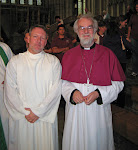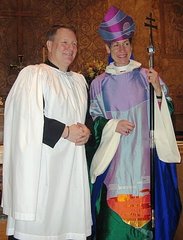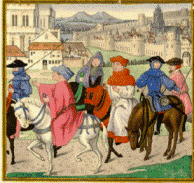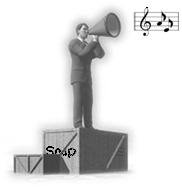 As winner of the Preaching Prize for 2008, I was asked to preach at the commencement Eucharist on graduation day, Wednesday, May 14, 2008 in the Chapel of the Good Shepherd at General Theological Seminary. This sermon is based on the BCP propers For the Ministry III: Exodus 19:3-8; Psalm 15; 1 Peter 4:7-11; Matthew 16:24-27
As winner of the Preaching Prize for 2008, I was asked to preach at the commencement Eucharist on graduation day, Wednesday, May 14, 2008 in the Chapel of the Good Shepherd at General Theological Seminary. This sermon is based on the BCP propers For the Ministry III: Exodus 19:3-8; Psalm 15; 1 Peter 4:7-11; Matthew 16:24-27 I was on retreat several years ago, very early in the discernment process that would eventually lead me here to General Seminary. Several of us had gathered at a monastic outpost for a five day silent retreat. We were not a group, just individuals who for our various reasons, had come to seek silence and prayer in the woods of northern Massachusetts.
The silence was to begin after Compline, so our first evening meal was a speaking meal. I learned that one of the retreatants at my table was heading back to seminary after a course in clinical pastoral education. She told us how, on the first day of the course at a hospital in Boston, the nun who was to be their supervisor had asked the incoming CPE class why they were there. A variety of answers were given: To be of support to the sick, to learn how best to comfort those in need of comfort, to help people -- my bishop made me do it! As they spoke, the incoming students began to notice that each reason seemed to garner a somewhat qualified acceptance from the good sister. The students begin to sense that there was a right answer as to why they were there, and that none of them had yet given it. Finally, their supervisor looked these new chaplains in the eye and told them the truth which perhaps none of them had yet come to know.
She leveled her gaze upon them and told them, “You are here, every one of you, because you are wounded. Each of you, in some way, bears a wound in your heart and soul. It may be a childhood wound, or a spiritual wound or a long healed physical wound, but you each have one. And God has called you out of that woundedness, to be with others in their woundedness, and to show forth God’s healing love.”
 Some few years ago, many of us took up everything we owned, our loved ones, and the good wishes of our parishes and dioceses, to follow the call of Christ -- and to come here to General Seminary; to this Close, to this Chapel, to this altar. We came with tremendous hopes and great faith. We brought all our life experience, be it long or short. We brought all our gifts and over three years I have come to know that among us there are myriad gifts, gifts of creativity, and inspiration, gifts of music and song, gifts of leadership (like when Arianne tells me what to do) and gifts of followership (like when I do what Arianne tells me to do!), gifts of tenacity, gifts of humor, gifts of compassion and understanding.
Some few years ago, many of us took up everything we owned, our loved ones, and the good wishes of our parishes and dioceses, to follow the call of Christ -- and to come here to General Seminary; to this Close, to this Chapel, to this altar. We came with tremendous hopes and great faith. We brought all our life experience, be it long or short. We brought all our gifts and over three years I have come to know that among us there are myriad gifts, gifts of creativity, and inspiration, gifts of music and song, gifts of leadership (like when Arianne tells me what to do) and gifts of followership (like when I do what Arianne tells me to do!), gifts of tenacity, gifts of humor, gifts of compassion and understanding.And we took up our own woundedness as well. We brought our shadow sides with us to seminary. We came with our egos and jealousies and pettiness. We came with our narrowness of mind. We came with our past hurts and our ability to cause hurt. We are the survivors of dysfunctional families, we are the sometimes broken hearted and the oft lame of spirit. We are all of us flawed, all of us wounded, and we are all of us in great, great need of God’s grace.
All of our great gifts -- and all of wounds came with us here to General. Each of us have taken up our cross, and brought it to this place, planted it firmly in the soil of this Close, and we have done so in order to do what God has called us to do -- to follow Christ.
And now, as our epistle says, the end of all things is near. We are poised to move from this seminary into the outside world. We go out of this place with much learning, more experience, but also with the realization that we can’t and won’t cure all the world’s ills, or all the church’s ills, and knowing that the healing that we offer is bounded by the properties of God’s creation.
So, what is it we will offer the church? What can we, as gifted yet flawed followers of Christ, do for the people that we are being sent to serve?
We can love them.
Our epistle today tells us to maintain constant love for one another, that love covers a multitude of sins. To love those we are called to serve in ministry is the one thing we can do that calls upon both our giftedness and our woundedness. It is through our own pain that we can truly see and feel the pain of others. It is in recognition of our own brokenness that we can come to love the brokenness of others. In loving, we serve our God wholly, because it is in loving we deny our false selves, and we bring to bear all sides of our true selves, our full humanity, the same humanity that was sanctified by God in our creation, in the Incarnation, and by our baptism.
In loving the children of God entrusted to us in ministry, and loving them out of our own life’s pain, our wounds are redeemed, and become the means of a further Incarnation, a conduit through which more of God’s love enters the world.
Love covers a multitude of sins, and sins are something we are sure to encounter and sure to commit on our journeys. Whether as lay or ordained ministers, our vocations will bring us into contact with our own sinfulness, and with the sinfulness and brokenness that are always part of Christian community.
I have some bad news: I don’t know how to tell you this, but: The church is not a hot-bed of mental and emotional health. Parishes and church institutions are where very many people bring their giftedness, yes, but also their hurts and fears, their narcissism and passive-aggression, their grief, their loneliness, and their pride -- and then there are the parishioners themselves!
In our ministries, I know that we will meet all manner and type of God’s children: And through it all, I think there is only one thing that we must always do -- and that is to love those God has called us to serve.
 The medieval mystic Julian of Norwich tells us that Love is without beginning, is and shall be without ending; that God wills that we be like God in wholeness of love to ourselves and to our even-Christians, our brothers and sisters in Christ.
The medieval mystic Julian of Norwich tells us that Love is without beginning, is and shall be without ending; that God wills that we be like God in wholeness of love to ourselves and to our even-Christians, our brothers and sisters in Christ.We go out from this place to preach and to teach and to participate in the sacraments, we are to form children in the faith, we are to work for justice, we will celebrate baptisms, deaths, marriages, conversions. We will preside over vestry meetings, and meet with committees. We will anoint the newborn and the dying; we will weep with the sorrowful and shout in celebration with the joyous. We will do many things, and undertake many tasks, and do all manner of good to the glory of God. And we will fail in many things; we will be humbled, and on some days, I expect, be brought quite low. We will be admired, despised, beatified and vilified. And I don’t think that much of that matters, in the end.
I think that the only thing we must do, and must do in every situation is love.
We have taken up our crosses to come to this place, and take them up again we must as we leave. Our own crosses, our own woundedness, our burdens and shortcomings and our own pain will be crucial to our ministering to the woundedness and pain of others and to our witness to a broken, wounded world. Our many talents and gifts and our learning will serve us well, that is most certainly true. But it is the wounds we bear that will serve us most when we seek to comfort the wounded, when we attempt to bring healing to a broken world.
 So, we take up our own crosses now to follow Christ even further and in so doing we take up the Cross of Christ as well; the cross on which Jesus was wounded, the cross by which the whole world was redeemed. For can there be, was there ever, a greater icon of unending love than the cross upon which Christ offered himself as a most loving sacrifice. The cross of Christ is the unequivocal evidence of the endless, unconditional love that God bears for all humanity.
So, we take up our own crosses now to follow Christ even further and in so doing we take up the Cross of Christ as well; the cross on which Jesus was wounded, the cross by which the whole world was redeemed. For can there be, was there ever, a greater icon of unending love than the cross upon which Christ offered himself as a most loving sacrifice. The cross of Christ is the unequivocal evidence of the endless, unconditional love that God bears for all humanity.Of God’s grace, Jesus was given for us, to be human, to share our life, to give himself for us, a holy and fragrant offering. All that was done for us: the cross, the tomb, the resurrection and ascension was done for love.
Many years after her first mystical experiences, Julian of Norwich was again visited with visions. She wrote, “From that time… I desired oftentimes to learn what was our Lord’s meaning. And fifteen years after, I was answered in ghostly understanding, saying thus: Wouldst thou learn thy Lord’s meaning in this thing? Learn it well: Love was His meaning. Who shewed it thee? Love. What shewed He thee? Love. Wherefore shewed it He? For Love. Thus was I learned that our Lord’s meaning was Love.”
We have come, bearing our crosses, to this place to be fed, to be formed, to be fortified in faith, and to be sent forth. Later today we cross that Chapel step that reads “through the gates and into the city” and today, we will take those words literally, and go out from this place to serve God’s people in God’s holy church. We won’t go out like the disciples, two by two, but single file (or we will if we were paying attention at rehearsal yesterday!) We won’t be carrying staffs, but we will be wearing some cool new academic hoods. We won’t be in sandals I don’t guess, but I know that whatever shoes Julie wears will be red!
We go from this place, having again taken up our crosses and with them the cross of Christ. And as we go, we lift high that cross, so that the love of Christ may be proclaimed wherever we go, in whatever we do for the people that God calls us to love and to serve.
Yes, the end of all things is near. And as Julian proclaimed, in the end all shall be love.
~ Amen.

© The Rev. Deacon Mark R. Collins







1 comment:
This is a great blog. Full of meaty information
Post a Comment